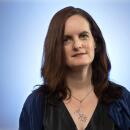And the L.A. Times Festival of Books writers’ survey says ...
- Share via
The fantasy of being a writer appeals to so many of us: sitting in a book-lined study crafting perfectly wrought sentences, which an illustrious publisher swiftly transforms into a bestselling book and an indelible literary legacy.
Missing from that idealized image is — well, the reality. Most writers struggle and stumble at every stage. It’s hard to start a manuscript and harder to finish it. Rejection is rampant. And finding a way to earn a living that allows time to write — that can be the toughest trick of all.
The Times sent out a survey to authors participating in the Festival of Books with questions about their experience as writers and got more than 200 responses. It’s not a random sampling, because all of the writers are successful enough to be invited (95% said they have published a book, and 58% said they make a living from their writing). The results do, however, tell an interesting story about the precariousness of life as a writer.
Most authors made their career choice early — the average age was 16, with only one respondent deciding to be a writer after 50. And there were many books assigned in school that caught their imagination, including “To Kill a Mockingbird” and “Catch-22.” In terms of the canon, 81% of respondents claimed they’d read “Pride and Prejudice” and 73% “Moby-Dick” — but only 29% had taken on David Foster Wallace’s “Infinite Jest.” (However, 40% admitted that they’d lied about reading “Infinite Jest.” Even authors experience peer pressure.)
For some, the next step was easy: 27% published their first book in their 20s. But approximately the same number (24%) didn’t get published until their 40s. Many writers (40%) published their first book in their 30s.
Along the way, there was a lot of frustration: 64% acknowledged they’d had a book rejected at some point — and two people said they’d been rejected 100 times. Notoriously thin-skinned writers have to put up with numerous other small humiliations, like reading to empty rooms: 65% said they had readings with fewer than five people in the audience.
Although these days it can seem as though getting a creative writing MFA is a prerequisite to a writing career, only 25% of our respondents earned MFA degrees. Most who did found it professionally advantageous (65%), and it was creatively useful for almost everyone (80%).
In terms of how books got published, 90% of respondents said they’d published with the major publishing houses, 37% with indie presses and 8% have self-published.
How flexible is their attitude to the changing publishing landscape? Fourteen percent said they had published a book in digital format only, but 50% were open to publishing e-books. What we read and how we read it could be radically different in the future, but people who feel compelled to write will keep on doing it and they’ll continue to find receptive readers.
More to Read
Sign up for our Book Club newsletter
Get the latest news, events and more from the Los Angeles Times Book Club, and help us get L.A. reading and talking.
You may occasionally receive promotional content from the Los Angeles Times.








